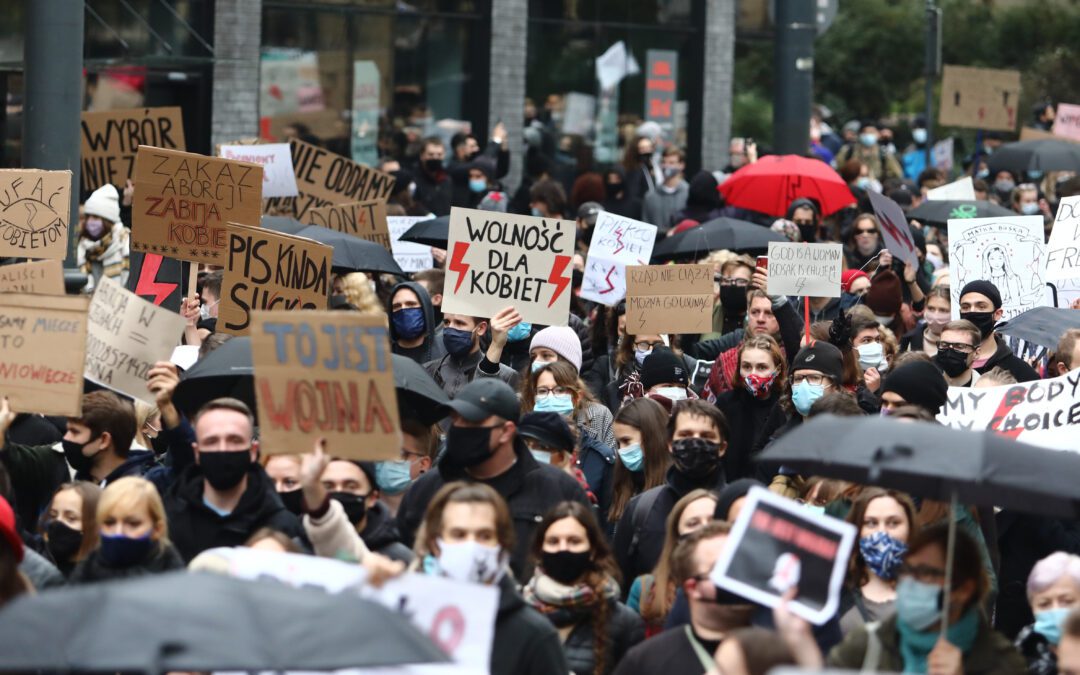As protests against a court ruling that almost entirely outlaws abortion in Poland grow, the demonstrations have received support from a variety of groups, including miners, taxi drivers and farmers.
Tens of thousands of people have taken to the streets since Thursday’s decision by the Constitutional Tribunal that abortions in cases where the foetus is diagnosed with serious and irreversible birth defects – which make up around 98% of legal terminations in Poland – are unconstitutional.
In a rare open confrontation with Poland’s powerful Catholic church, on Sunday some protesters disrupted masses and others vandalised church buildings.
A protest inside Poznań Cathedral today pic.twitter.com/PlOdSwGTFS
— Notes from Poland 🇵🇱 (@notesfrompoland) October 25, 2020
Some campaigners distributed posters of crucified pregnant women during mass. Abortion helpline numbers were also strewn across the facades of cathedrals.
A monument to Polish Pope John Paul II in the small town of Konstancin-Jeziorna was vandalised with red paint, prompting the town’s mayor and his deputy to personally clean the statue.
In Warsaw, one parish priest gave far-right activists permission to defend his church from protesters. As a result, they began physically removing women from the premises.
Young Polish women tell the Catholic Church "wypierdalaj" ("get the fuck out"). Would have been unbelievable a few years ago. Change is coming. https://t.co/dY6EvjAyBM
— Roman Werpachowski (@RWerpachowski) October 25, 2020
In the evening, crowds numbering in the thousands gathered outside church buildings in cities such as Warsaw, Kraków and Poznań. Many further demonstrations have also taken place in smaller towns, often with hundreds taking part.
Poznań teraz. Tłum ruszył pod Katedrę. Nawet Łańcuch Świtała nie zgromadził w Poznaniu takiego wkurwu. @strajkkobiet #ToJestWojna #dymisjaTeraz pic.twitter.com/twZ4ymN9xb
— Grupa Stonewall (@GrupaStonewall) October 25, 2020
While the protests have been organised and led by women’s rights groups such as Strajk Kobiet (Women’s Strike), support has also come from some unexpected places.
In Nowy Dwór Gdański, a town of 10,000 inhabitants in northern Poland, local farmers joined the protests by driving their tractors slowly at the head of the march, reports Wirtualna Polska.
Signs mounted on the fronts of the vehicles said “We want choice, not PiS-terror” (referring to the name of the ruling PiS party) as well as “Wypierdalać” (Fuck Off), which has become a slogan of the protests.
Some Polish farmers have recently been protesting a proposed animal protection law, which they say threatens their livelihood. Earlier this month, farmers blocked over 100 roads around Poland and staged protests outside parliament.
Zaskakujący zwrot akcji.
"Chcemy wyboru, a nie terroru".
Rolnicy wspierają @strajkkobiet w Nowym Dworze Gdańskim. #WyrokNaKobiety #piekłokobiet pic.twitter.com/lu0G7GXRzU
— Wiktor Misztal😷 (@MisztalWiktor) October 25, 2020
On Monday, a major coal miners’ union, Sierpień ’80, issued a statement in support of the protesters. The union’s leader, Bogusław Ziętek, said the organisation considered “breaching the compromise that has been in Poland for several years” to be “unacceptable”.
“Compromise” is the term often used in Poland to refer to the abortion law introduced in 1993 that allows terminations in only three cases: when pregnancy threatens the woman’s life or health; if pregnancy is the result of a criminal act (such as rape or incest); or if the foetus is seriously malformed.
Ziętek warned that the government assuming “the role of a super-arbiter of human consciences” suggests that it is “heading in the direction of a totalitarian state”. While the abortion ruling was issued by the Constitutional Tribunal, the ruling Law and Justice (PiS) party is widely seen as being behind it.
In 2016, PiS appointed its own judges to the tribunal instead of those legitimately nominated under the previous government. It also engineered its candidate, Julia Przyłębska, a close associate of PiS chairman Jarosław Kaczyński, into the presidency of the tribunal in breach of procedures.
Polish unions are often socially conservative – and the largest, Solidarity, has been an ally of PiS. But in its statement, Sierpień ’80 said that it believes “recent decisions of the rulers on political, social and economic issues justify the loud opposition of the whole society”.
The union was at the forefront of the underground miner strikes organised in September to oppose government plans for a swift shutdown of inefficient Silesian mines. The protests eventually led to a compromise this month.
Because of current restrictions on public gatherings due to the pandemic, some of the abortion protesters have demonstrated by using their cars to block traffic and beep their horns.
Yesterday, as several hundred cars took part in such a protest in Kraków, they were joined by some taxi drivers, who displayed Women’s Strike logos in their windows and flew white-and-red Polish flags. Taxis also took part in a similar protest in Warsaw, reports Radio Zet.
Today, women’s groups again organised blockades of busy traffic intersections in large cities, with exact locations announced shortly before the start of the protest at 4 p.m.
On Wednesday, the protest organisers are planning on holding a strike, similar to those that took place on 2016 in response to a previous effort to restrict the abortion law.
“We’re not going to work. We are supported by more and more business owners who have not received proper aid from the state…The state has absolutely no effective plan to help companies, which is why businesses support us,” Marta Lempart, one of the leaders of the protests, told Gazeta Wyborcza.
On Friday, protesters are planning to descend on Warsaw for a joint march.
Main image credit: Jakub Porzycki / Agencja Gazeta

Maria Wilczek is deputy editor of Notes from Poland. She is a regular writer for The Times, The Economist and Al Jazeera English, and has also featured in Foreign Policy, Politico Europe, The Spectator and Gazeta Wyborcza.




















